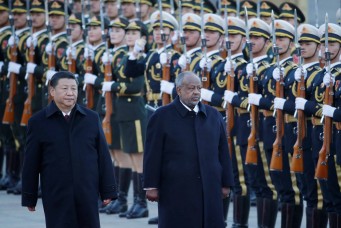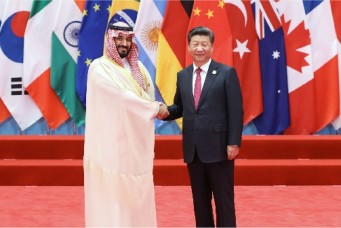Seznec on the New Silk Road
There is a new Silk Road quietly emerging that connects the booming economies of East Asia with the oil-rich Gulf states of the Arab Peninsula and, through them, European markets accessible just across the Suez canal.
In antiquity, the overland route known as the Silk Road once connected two continents in bustling trade across improbable distance. The smaller, more connected, world of today has little use for this ancient route. But there is a new Silk Road quietly emerging that connects the booming economies of East Asia with the oil-rich Gulf states of the Arab Peninsula and, through them, European markets accessible just across the Suez canal.
Jean-Francois Seznec, currently a visiting associate professor at Georgetown’s Center for Contemporary Arab Studies, is a senior advisor to PFC Energy in Washington, DC. The Cairo Review sat down with Seznec in Aspen, Colorado to discuss this new Silk Road on August 8, 2012.
CAIRO REVIEW: So what is the emerging Silk Road?
JEAN-FRANCOIS SEZNEC: The concept, very simply, is that the Gulf states—especially Saudi Arabia, Kuwait, Qatar, the UAE, etc.— are selling oil to the Far East. They’re also becoming major producers of chemicals and metals, which are also sold to the Far East. On the other side, the market share of China for all manner of goods from cars to refrigerators is increasing like mad. So the links between East Asia and West Asia are increasing extremely quickly in terms of trade and in terms of market share. Now, where it becomes a little bit like the old Silk Road, especially when we talk about a place like Dubai, is that you have a lot of goods that go to Dubai from Europe or the United States, get transformed in Dubai, and are then sent out to the Far East. Vice-versa, a lot of goods from the Far East come to Dubai and are then re-exported.
The key here is that a lot of the oil and gas that is sold to the Far East brings money to Dubai, then Dubai and the region import stuff from Europe, as well as from the Far East. So it’s creating this enormous trade route, which is accompanied by the exchange of individuals as well. The contacts between China and the Gulf, in particular, are exploding. A lot of Middle Eastern companies have a very big influence in China and vice-versa. In the 1980’s there was no Chinese presence in the Gulf, none. Today their embassies take whole blocks of cities. Their influence is increasing drastically.
CAIRO REVIEW: What exactly have the Gulf countries done to build and attract this new ‘Silk Road’ trade?
JEAN-FRANCOIS SEZNEC: Well, from the Chinese point of view, the great advantage of dealing with the Arab states of the Gulf is that they are very reliable suppliers. Especially in terms of oil, the reliability of supplies in oil is vital for the Chinese, even more important than price. So they have to be confident that whoever they buy oil from will supply. They have learned over the years to like the Saudis in particular because Saudi Aramco’s main policy, above and beyond any politics, is to be a reliable supplier. So now the Saudis are very happy to welcome Chinese companies to work in the kingdom and, vice-versa, the Chinese are very happy to have a huge investment by Saudi Aramco in petrochemicals in China. For example SABIC (Saudi Basic Industries Corporation), a large Saudi petrochemical company, has invested in a plant near Shanghai, they are putting another plant next to it, and have established a research center there.
Now, in all this, we tend to not talk enough about Japan but Japan is one of the largest trade partners in the Gulf and they’re also very big investors there. Japan imports a lot of its oil from the Gulf and sells an enormous amount of goods. Companies like Lexus and Sumitomo, one of the largest investors in the Kingdom of Saudi Arabia, etc. etc. So there are tremendous links.
CAIRO REVIEW: Is there interest from Asia—China, Japan, Korea, etc—in cultivating relations with Middle Eastern countries outside the Gulf if stability can be assured? Are they exploring these areas?
JEAN-FRANCOIS SEZNEC: Well, yes. China, of course, is big in Sudan due to its oil supplies and I think Asian countries would like to develop their business in Nigeria because of the energy resources there. They used to have pretty good relationships with Iraq and, in fact, the Chinese are now investing heavily in the oil fields of Iraq. They have at least two huge contracts to develop oil in Iraq and right now they are taking advantage of the fact that the big US companies are leaving Iraq. You’ll find that Exxon is signing in the Kurdish territories and they’re still in West Qurna in South Iraq but the Chinese are now negotiating to buy a large percentage of that contract. They also have a huge percentage, almost 50%, of the contract that BP signed on the Rumaila field, which is the second largest oil field in the world. BP signed the contract but all the work is done by the CNPC (China National Petroleum Company). So there is a lot of interest. The problem is that it may be successful in the future but right now it’s still just in the very beginning.
CAIRO REVIEW: So how do you see all this manifesting over the next five to ten years? What changes will we see to global trade flows?
JEAN-FRANCOIS SEZNEC: Well, what we haven’t seen yet is enormous political and diplomatic change related to that. Right now it’s just business. Whether we will see more Chinese political influence in the region because they want to protect their interests or the natural flow of trade, it may happen. But right now it’s happening by itself so nobody’s taking political risks and everybody’s benefiting from it. So if you mean military support from China in the Gulf then no, that I really don’t see happening. Right now the key issue for the Saudis in particular, but for the UAE as well, is freedom of navigation. Because if they have the straits of Hormuz, the straits of Malacca, and so on, free to them that means all their goods can go to China and goods can come from China. Right now there already is freedom of navigation. Ok, you have some pirates here and there but, nevertheless, you have freedom of navigation. Well that’s provided for free by the U.S. navy. So why would the Chinese spend money doing this if somebody else is doing it for them? So I think they will want to, little by little, develop some kind of military power that will match, to a certain extent, their own trade growth but they’re not going to go to any great effort.




